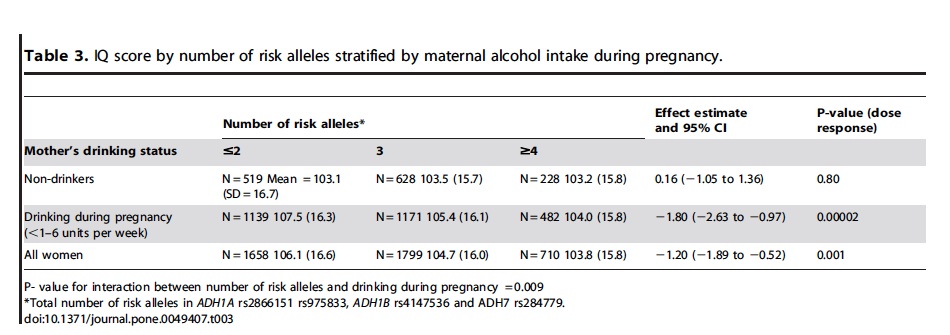Alcohol in pregnancy and IQ of children
As of the 23rd May 2022 this website is archived and will receive no further updates.
understandinguncertainty.org was produced by the Winton programme for the public understanding of risk based in the Statistical Laboratory in the University of Cambridge. The aim was to help improve the way that uncertainty and risk are discussed in society, and show how probability and statistics can be both useful and entertaining.
Many of the animations were produced using Flash and will no longer work.
Some of the coverage of yesterday's story about drinking in pregnancy and IQ of children was not entirely accurate. The Times reported that 'women who drink even a couple of glasses of wine a week during pregnancy are risking a two-point drop in their child's IQ', and 'children whose mothers drank between 1 and 6 units a week - up to three large glasses of wine - had IQs about two points lower '(than mothers who did not drink).
But let's look at Table 3 of the paper, which is available here.

Here we see that children of mothers that drank had systematically higher IQs than those who didn't! But nothing can be inferred from this (except that the Times was not exactly correct).
This of course is the whole problem of carrying out these studies: there are many 'confounding' factors that are associated both with mothers' drinking habits and children's IQ, and this makes teasing out the underlying relationship very tricky.
This is where the ingenious idea of 'Mendelian Randomisation' comes in. Genes are assumed independent of confounding actors, so it is as if women have been randomly allocated to the genetic groups in the Table, and so they should be balanced for all other factors. The genes are seen to be associated with the IQ of offspring among women who drink, and the genes were selected as those that regulate uptake of alcohol, and babies who may be exposed to greater alcohol have on average lower IQs. But maybe the genes affect babies in other ways than in uptake of alcohol? But this is deemed implausible, as there is no relationship seen in non-drinkers.
This is a very clever and careful study, to be taken very seriously. But it does not allow an estimate of the effect of drinking, and the authors are careful not to give one (even if they appear to have been rather happy to declare public health implications, which seems to be somewhat overstepping their role as epidemiologists).
Very crudely, if we took the lowest group as similar to non-drinkers, then the effect of moderate drinking might be estimated as around 2 points, but nobody would want to put this in an academic publication.
In addition, an important issue is the alcohol quantities. The 'drinkers' include those reporting between 1 and 6 units a week - quite a range - and we can also assume that this is an understatement of true consumption. So what 'moderate' drinking actually means is open to some question.
As usual, the NHS Behind the Headlines site had an excellent discussion.
Added later: I have made a few edits in this blog to make it clearer that I am not questioning the study's basic conclusions, just pointing out that some of the coverage misunderstood the (somewhat subtle) findings
- david's blog
- Log in to post comments

Comments
Doc Killjoy
Fri, 16/11/2012 - 9:10pm
Permalink
One moment your honour
Umm, may I be a killjoy and point out that the IQ mean difference (103.2 - 104.0) is quite small (most likely not significant - you're the statistician) in the group with the highest number of ADH risk gene alleles.
Which means that at in the group where the risk is greatest (genetically speaking), the kids of drinking mothers lose the most iq relative to their brethren bred by non-drinking mothers.
(In Tabloid Speak: High-Risk Mothers That Stay Off The Good Stuff Give Offspring Headstart On Kids Spawned By High-Risk Mothers Willingly Quaffing Away)
Which again translates to that if you can get (at least) the high-risk maternal population off the booze, there should be some pretty significant public health (and maybe also educational, and even perhaps judicial) benefits to reap.
Also the decline in IQ mean is surely more consistent in the drinker's group (107.5 - 105.4 - 104.0) compared with the non-drinkers group (103.2 - 103.5 - 103.1). Again I'm not sure that' s significant (I'm not a statistics guy).
But it sure looks like something happens when that alcohol joins up with those risk alleles.
This of course only holds up if you accept that the N's are large enough in the first place. But if you don't then you don't have to believe anything in that paper really.
(And if we allow for speaculation: it would be very interesting to see a socioeconomic breakdown of the groups. My tip is that the moderate drinkers with low risk genetics come out pretty clearly on top there - quite considerably better than their abstaining sisters of similar risk.
(Sidestep for reasoning, made simple:
Good genes, a bit of booze = your normal resourceful (upper) middle class mother with Friday night red wine glass in hand.
Good genes, no booze = Particular reason - ethnic group, religious persuasion, medical condition, economic hardship. Maybe not so middle class).
And if that's accurate, then their kids can afford the projected "IQ loss" better, because they have both the genetics and environment to compensate.
Just a thought.)
paulbarden
Mon, 19/11/2012 - 10:06am
Permalink
A confounding factor
IQ is not immutable from birth. I suggest that a woman who drinks while pregnant and her partner may well provide a different and perhaps less stimulating domestic environment for the first eight years of her child's life.
David L. Pahlka
Wed, 08/05/2013 - 5:47pm
Permalink
Drinking and I.Q.